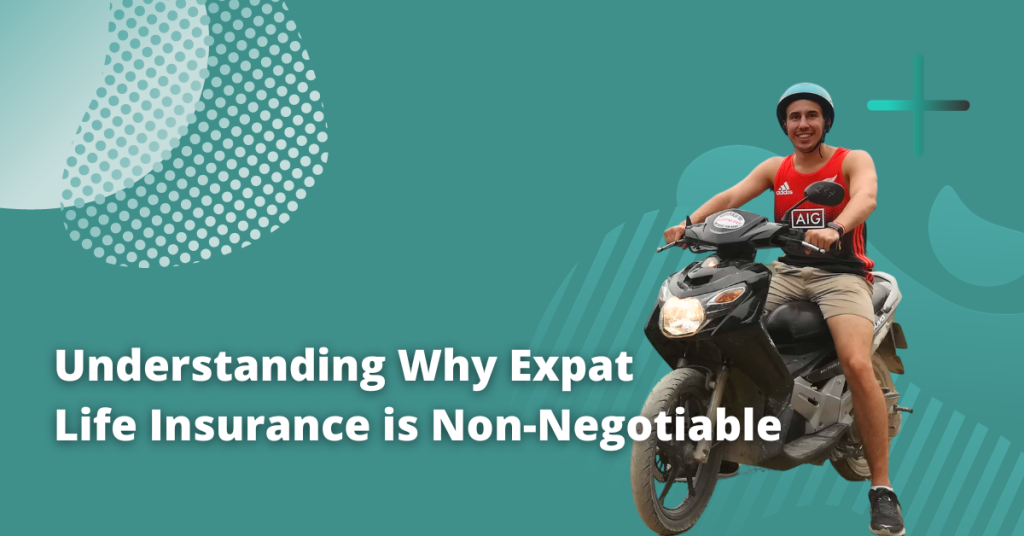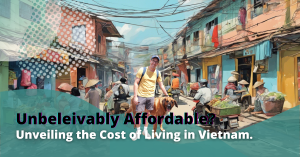People who live and work outside of their home country need expat life insurance for the same reasons as anyone else: to protect their loved ones financially in the event of their passing. The life insurance should cover any and all leftover financial responsibilities such as repatriation and funeral costs, mortgage/rent payments, car loans and ongoing child care costs.
Us expats are also likely exposed to a whole heap of health risks that aren’t common to their home countries. Like increased risk of fatal road incidents (as is the case in SEA), specific diseases like dengue and malaria and lower quality healthcare.
Unfortunately, navigating the world of expat life insurance can be pretty daunting given the myriad of options and factors for consideration. These include how much you can afford to spend on the policy, your country of residence and where you’re likely to live in the future. You also need to consider your lifestyle, hobbies and activities, length of insurance term and future needs of any potential dependants.
As some of my clients and readers will know, I rave about life insurance when it comes to personal finance simply because it is one of the best financial tools to exist that helps preserve and ensure financial well-being. Believe it or not, it’s not just used by the wealthy: but, maybe you should wonder why it is?
This article will delve into the specifics of life insurance for expats, highlighting why it’s essential, the challenges involved, and how to navigate these waters successfully.
Why is Expat Life Insurance Vital?
The importance of expat life insurance cannot be overstated. First and foremost, life insurance provides financial security for your loved ones if the worst were to happen. This is even more crucial for expats living abroad because the sum insured (insurance payout) would act as a much-needed financial injection to help your family cover all sorts of expenses such as relocating home, new house/apartment deposits, flights, and more.
In addition, expats need life insurance to also cover the standard costs of living that a salary would normally pay. Such as:
- Providing general financial security for their loved ones
- To cover the costs of a mortgage or rent
- Pay for car payments and/or clear other personal loans & debts
- To pay for childcare costs and future tuition
- Covering the cost of a funeral and other final expenses
- To protect the family from legal challenges
- Provide generational wealth
Unfortunately, too many people are more than happy to avoid the “what if the worst were to happen” topic, but it’s really not one that should be sidelined.
Example: Family of Four
For example, if you’re a family of four with two earners and your personal finances in order, you would likely have made a plan for your financial future that always takes into consideration having two incomes. You would plan for your incomes to cover tuition, childcare, family holidays, health insurance, rent/mortgage, car/vehicle loans, and retirement.
But what happens if one of those incomes were ripped away?
If you have a mortgage, will the sole earner with two children be able to keep up with mortgage payments and house insurance? The likely answer is they won’t, which would lead them to having to sell the property you worked so hard to get.
As expats, will one income be able to cover rent, childcare and tuition? And if it is, would there be enough leftover at the end of the month to put toward retirement or holidays?
Unfortunately, the most common outcome, on top of the horrendous emotional distress, is that families end up financially strained and the worst time of their lives.
This is why life insurance is vital for expats. If planned correctly, the payout can replace one person’s income for 10, or 15 years or more. It can cover every single cost that your family would face and leave enough to keep living. Knowing that your loved ones will be taken care of in your absence should be priceless, and give anyone the peace of mind to enjoy their experiences abroad without worrying about any potential financial strain if the worst were to happen.
Challenges in Navigating International Life Insurance
Despite its importance, acquiring expat life insurance can be fraught with challenges. One of the primary difficulties is the unfamiliarity with the insurance landscape in a foreign country. Policies, regulations, and insurance providers can be vastly different from what you’re used to in your home country or it may simply be the first time you’re considering life insurance in general.
Another significant challenge is often the language barrier; and, not just dealing with policies in a foreign language. Life insurance comes with a lot of intricate details and industry jargon is usually one of the biggest hurdles to overcome when assessing options. Misunderstandings and miscommunications can result in unsuitable and inadequate coverage that adversely affects you down the line.
So how do I recommend navigating the international life insurance world?
Well, having worked in the finance and insurance industry my entire career and with 4 years experience in Southeast Asia, I would only ever recommend that expats consider international life insurance providers that are well-regulated in big international jurisdictions.
By this, I do not mean transnational life insurance providers who have local branches in SEA such as AIA, Generali, Sun Life, Manulife and the like, because while they are technically international life companies, their policies do not suit expats at all.
What I mean is true international life insurance companies that specifically cater to expats such as Atlas Life and Unisure among others.
How to spot a trusted life insurer
It’s not always easy identifying a trusted life insurance company as an expat simply because there are so many options. Even if you give “Life Insurance Expat” a quick Google, you’ll nearly only be inundated with paid ads making it even harder to identify any decent options.
The best way for you to spot a trusted provider is to:
- Check the financial strength of the insurance company by looking up their financial ratings from a reputable rating agency such as A.M Best, Moody’s and Fitch
- Read the policy terms and conditions carefully and make sure you understand what is covered and what is not
- Get quotes from multiple insurers so that you can compare coverage and prices
- Talk to a financial advisor or insurance broker as they can give you the finer details and advice
Most importantly though, you want to find out who the insurance company’s reinsurer is. A reinsurer is the company that holds the actual risk and will pay out if the policyholder passes away. Some common reinsurers to look out for include Swiss Re, Lloyd’s, Reinsurance Group of America (RGA) and SCOR.
| NOTE: Many “expat life insurance companies” are shallow fronts that “reinsure” themselves. These companies usually do not have enough excess cash to cover significant payouts, so if the life insurance provider you are considering is not reinsured by a top 50 third-party reinsurer, do not take out a policy with that company. |
Types of expat life insurance
There are plenty of different expat life insurance policies to choose from, but in reality, most aren’t suitable for the majority expats. In broad strokes, I always tell people to stay away from life insurance policies that have any type of investment element. They’re simply not worth it.
Instead, you’ll want to choose one of the following three policies:
- Term life insurance
- Term life is a type of life insurance that provides coverage for a specific period of time, or term. If the insured person passes away during the term, the beneficiaries will receive the death benefit. Out of all policies, term life insurance is the most affordable.
- Whole life insurance
- Whole life is a type of life insurance that provides coverage for the insured person’s entire lifetime. The premiums are fixed, and the policy may or may not build a cash value over time. Usually, I would recommend one that does not as they are likely cheaper. Whole life insurance is more expensive than term life insurance, but it is a great way for families to build generational wealth.
- Critical illness life insurance
- Critical illness is a type of life insurance that provides a lump sum payment to the insured person if they are diagnosed with a critical illness, or in the event of passing. The amount of the lump sum payment varies from policy to policy, but it can be used to cover a variety of expenses, such as medical bills, lost income, and/or home modifications.
The type of international life insurance that is right for you will depend on your individual needs and circumstances. If you are looking for affordable coverage for a specific period of time (which most expats do!), then term life insurance would be the best option.
Alternatively, if you want to ensure that your loved ones are financially protected for the rest of their lives, then whole life insurance would be the way to go if your budget allows.
Comparing Expat Life Insurance Quotes
When it comes to choosing expat life insurance, the easiest way is to simply get and compare a bunch of quotes. This should give you a fairly clear idea of the cost of different policies and allow you to make an informed decision based on your budget and coverage needs.
However, it is incredibly important to remember that the cheapest policy is never the best. Cheap is cheap for a reason and usually it is because something within the policy is lacking. It could be that the provider is not regulated, that the cover is not sufficient or that the administration of the policy is poor when it needs to be efficient. Often, it also comes down to the ability of the insurer to pay when needed.
Remember, there are life insurance companies that target expats that aren’t actually backed by a legitimate reinsurer. Always ensure that the life insurance provider that you are considering is reinsured by a top 50 third-party reinsurer such as Swiss Re, Lloyd’s, Reinsurance Group of America (RGA) or SCOR.
You should also consider the policy’s features, exclusions, and the provider’s reputation. Furthermore, be aware of any hidden costs or fees that may not be included in the initial quote.
Tips for Choosing the Best Expat Life Insurance
When selecting the best expat life insurance, it’s easy to get side-tracked by cost and not focus on understanding your actual needs. So before looking at your budget, consider factors such as health, age, financial obligations, and your dependants’ needs.
You can then start thinking about additional factors when choosing a life insurance policy which include:
- The amount of coverage you need.
- The length of the term.
- The premiums you can afford.
- The financial strength of the insurance company.
- The policy’s features and benefits.
Once you have found a couple of life insurance policies that suit your expat life, you can then review the various costs alongside your actual financial situation to see what you can afford.
If all else fails, seek professional advice from a financial planner or insurance broker. The good ones never charge anything extra and if you speak to the right one, they won’t try and force anything on you either!
Conclusion: Securing Your Future with Expat Life Insurance
As an expat, if you have any loved ones that depend on you financially then you need to seriously consider getting life insurance. Because, if your income helps pay for mortgage, rent, childcare, loans or other living costs and you were to pass away, your dependents would end up incredibly financially stressed and likely struggle to adjust going forward.
By simply having that extra level of security in place, you would provide a whole heap of peace of mind to your family and protect their future financial and physical well-being!


